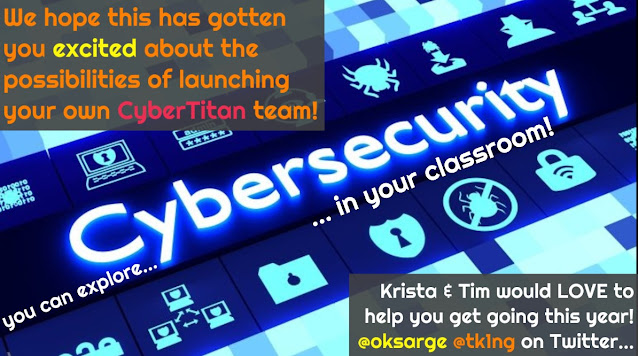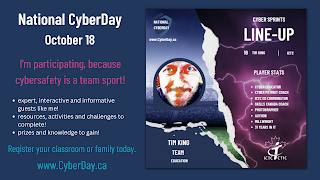The idea of bringing cybersecurity awareness into a public school classroom makes many people uneasy, but as I said in a recent interview, “Cyber is never as complicated as you think it is, don’t let the lingo and media scare you off.” There are a couple of events happening in October, which is cybersecurity awareness month in Canada, that’ll give you the resources and connections you need to explore cybersafety in your classroom.
CyberDay is the gentle introduction to cybersafety, privacy and cybersecurity.
It’s happening on October 18th and the Knowledgeflow Cybersafety Foundation has been working like beavers to put together interactive resources and talks with experts that’ll make cyber accessible to everyone.
CyberDay is all online and you can pick and choose what you want to use in your classroom. It could be a short lesson, a longer activity or even a whole day event depending on how you want to use it.
Sign up is on the site and you can even do some preliminary learning with it by having students submit questions to experts. If you don’t think you have students in your class who are curious about hacking then you’re not getting where they spend most of their time (it’s online). In this event students can ask white hat hackers and pentesters about their work. That might lead more students to consider cybersecurity pathways which are in such short demand that Canada is looking overseas to bring people in because we’re not producing these careers at home.
As they say on the site, “Cybersafety is a team sport”. You’re not alone in broaching this sometimes unnerving subject, you only need to connect to CyberDay to see how much help is on hand.
In case the ease of access isn’t compelling for you, perhaps the idea that if we’re going to use interconnecting education technology in our classroom, we should be covering best practices with our students will. I attended a conference last week where Michael Canuel from LearnQC trotted out some current stats that should make you sit up and take notice:
The need for better cyber-awareness should be self evident, but what isn’t (to me) is why public education seems to go out of its way to ignore it. While listening to Michael’s talk about the poor state of cyber-skills in Canadian education, I couldn’t help wondering if it isn’t intentional. Many public education organizations have vested political interests in keeping the status quo. From a professional perspective I was left desperately hoping that educators aren’t intentionally ignoring privacy and cybersafety skills in order to sabotage eLearning. CyberDay would be a great first step in proving that skepticism misplaced.
One of the angles I was considering for CyberDay was just how well suited it is as a library activity. I did a piece for the Ontario Library Association’s Teaching LIbrarian online magazine about how cybersecurity (as a digital literacy) makes a perfect connection with the roll a modern learning commons has in our schools.
Library learning commons are often the first point of contact for emerging technology. Way back in middle school in 1982, I first laid hands on a computer in our school library when we set up Commodore PETs and saw the neon green wonder of coding for the first time.
I’m hoping I can connect with the OSLA about reaching out to librarians over the next couple of weeks in order to empower them to take on this latest in a long line of emerging digital literacies. Cyber isn’t as scary as you think, and it’s a great opportunity for iterative and immersive learning.
CYBERTITAN: Canada’s student cybersecurity competition
CyberPatriot has a live map of registered teams on their site. As you can see, compared to the United States, Canada’s engagement with the competition has been… less. I’m particularly focused on connecting under-represented groups in the competition. When I coached the first ever top all-female team to the national finals in 2019, I became aware of just how toxically masculine cyber can be. I’d move mountains to get more female (including non-binary and female identifying) students into it. I’d move more mountains to get BIPOC and indigenous students on board too. The finalist teams all tend to come from major cities and specialist schools which tend to cater to socio-economically advantaged youth. Cyber isn’t an urban/wealthy issue, it’s an all-of-us issue, and rural communities, families and businesses are just as in need of safe and secure connectivity as everyone else.
You can see what the competition is about from this Prezi that the mighty @oksarge and I presented at ECOO summer camp in 2020. Students learn hands-on defensive IT skills by fixing compromised WIndows and Linux operating systems in virtual machines.
 |
| Learning to wrangle virtual machines is a big part of CyberPatriot. You’ll find this technology to be an incredible tool for teaching computer technology. You can abuse VMs in all sorts of ways that’d make your IT department faint, and when it all goes wrong? Just close the window. |
VMs are simulated computers that happen inside a window, so you could run Apple OSx in Windows, or Windows in Linux using a VM. Because it’s all virtual there is no chance of spreading malware from inside a VM, which is why they’re used in cybersecurity. Learning virtualization technology like this is really eye opening for students, and it’s not nearly as tricky as you think it might be.
 |
| Our lab goes full disco during a CyberPatriot round. It’s a six-hour competition window. Pizza is brought in and snacks are available. Students dig right to the end, making a mockery of the idea that kids today have no attention span. |
The competition is exciting and students genuinely enjoy it and return year after year. Live world wide scoring pits them against students from around the world, so if they’re competitive they can follow the scoreboard and dig for points, but CyberPatriot can also be played from a purely educational perspective where students still benefit from the teamwork, iterative problem solving and cyber-skills development. Our junior teams are always reminded that this is a reconnaissance season with no expectation of winning. Learn the ropes and get into it. Many become competitive anyway because (here it comes again): cyber isn’t as complicated as you think it is.
Sign up is due by October 5th, but no money is due then (fees are waived for non-male teams) and I’ve always found that SHSM and other student success initiatives are eager to help cover costs (which aren’t due until mid-November). The swag is excellent (t-shirts, medals!) and once students understand how it all works they always say the same thing (here it comes again), “it’s not as hard as I thought it would be.” That’s cybersecurity in a nutshell.
Libraries would be another great focus for CyberTitan, where students could access the technology they need and develop their library and librarian coach into a cyber-aware school-wide resource. My students have used the skills learned in CyberPatriot to help our school with technical support and many went on to support local businesses as well. The benefits from this are many, we just need to get more Canadian educators to take that step and sign up a team. Once they do, they’ll be back!
 |
| It’s still true! If you’d like to talk about running a high school team, I’ve got lots of experience and would be thrilled to help you get going. Krista ran a very successful middle-school team in her first year coaching and can talk you through what to expect in that division. |
from Blogger https://ift.tt/9Jn4NRi
via IFTTT


%20(1).png)





